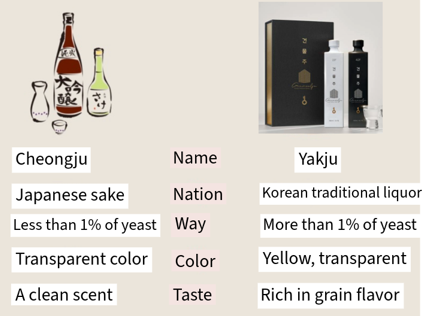
The concept of takju in Korea was strong, alcohol for the common people and Cheongju for hipsters. However, the Korean culture of Gayangju was destroyed as the system and laws regarding Korean occupation of Japan and alcohol changed. They changed the culture of making alcohol in breweries, banned the sale of Gayangju, and paid taxes. The Korean style of rice wine could not be made anymore, and the Japanese sake was sold under the name Cheongju. And it was legally removed. Sake, the traditional rice wine of Japan, is Cheongju! This law is still in effect today, and the Korean style of rice wine was classified as ‘yakju’ and had to fight prejudice. When Korean people couldn’t get Korean rice wine, Japanese-style rice wine produced in breweries was on the table, a type of rice that we are familiar with. Japanese-style rice wine and Korean-style rice wine are completely different. Japanese-style rice wine is a fermented wine that emphasizes cleanliness by cultivating germs directly without using yeast. Korean-style rice wine makes use of the natural taste. The Japanese-style wine uses the name Cheongju. In response, Andong Soju was proudly introduced to globalization under two brands. Building owners and the whole world are someone’s dreams. Junara Co., a company that serves dreams under its brand, is a company that gives dreams to someone through its brands and product (CEO Yang Kum-yong and CMO Jungwon Kim). As a result, some of the profits of building owners are providing support to the underprivileged, vulnerable to global travel, and owners of sports youth.
SAM KIM
US ASIA JOURNAL



